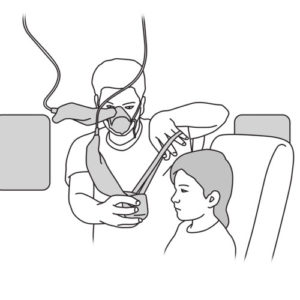Taking care of a child with medical complexity is hard, continuous work. Parents do this, with an astonishing lack of complaints, because they love their child. For many parents, their child’s comfort and happiness is their number one priority in life. We are humbled on a daily basis, by your strength and devotion.
You are the most precious part of your child’s life. To sustain the love and care that you provide to your child, you must take care of yourself, at least a little, everyday. Do not ignore your basic necessities of healthy eating, hydration and sleep.
Sometimes the stress of looking after a child with medical complexity feels so overwhelming that you might have the impression you are unable to cope. Strategies that have helped in the past may not be helping. In this case, we strongly encourage you to seek the help of a professional. Please discuss this with your healthcare team.
No matter where you are on the rollercoaster ride, PLEASE take a few moments to browse through the following sections:

If you have ever taken an airplane flight, then you know that every airline says: in the case of an emergency, put your oxygen mask on first before helping to put a mask on the child. This is because if you run out of oxygen yourself, you can’t help anyone else. Parenting a child with medical complexity is the same. If you don’t take care of your own physical and emotional health, you risk experiencing stress and fatigue which will inevitably interfere with your capacity to care for your child. The first step towards taking care of yourself is to believe this truth. Once your oxygen is on, take a breath of empowerment and move forward, for yourself and for your child.
This is easier said than done but once you start this habit you will wonder why you did not do it sooner. We promise it will be a worthwhile investment for you and for your child. First, consider something that you love to do – it might be going for a run, baking cupcakes, reading a book, watching television, singing, pursuing a hobby, talking with a good friend – it really is your choice. (If you are having trouble thinking of something that you love to do, we are worried that you might be very exhausted and perhaps very sad – please speak to your own doctor or your child’s healthcare team about this.) Once you find some activity that you enjoy to do (or perhaps several) then schedule it into your day as a priority task. Start with a small activity, one that is realistic and feasible – like 30 minutes of walking outdoors or listening to your favorite music. Enlist the support of a family member, friend or caregiver to look after your child so that you can look after yourself (for a few minutes at least). Taking this time will help you refresh your body and spirit so that you can continue to care for your child to the best of your ability.
Parents of even the most fragile child tell us of the joy that they experience with their child. Joy comes in many different forms; whatever it looks like, notice it, celebrate it and grab ahold of it whenever you can. Celebrate your child (with hugs, words or however you wish) and appreciate your child’s strengths. Stretch this positive thinking out to include yourself – be kind to yourself and take a moment to see your capacities, your strengths. Find ways to feel and express gratitude, towards your child, yourself and others. This kindness will combat negative guilt and self-blame.
If you receive offers of support, say YES. Consider what would help you and your child and which tasks could be completed by someone else. In almost every community, there are potential volunteers who may be willing to help you cook, clean or care for your child. See Links of interest for some online parent support resources and regional respite services. Talk to your child’s healthcare team to find out more about potential sources of support, including financial support and caregiving services.
Parenting a child with medical complexity is like being on a rollercoaster in the dark – the only guarantees are that: a) there will be ups and downs and b) they will be both predictable and unpredictable. Try not to waste your precious energy trying to control everything. Believe in yourself and know that you are doing your best, we certainly think so!








